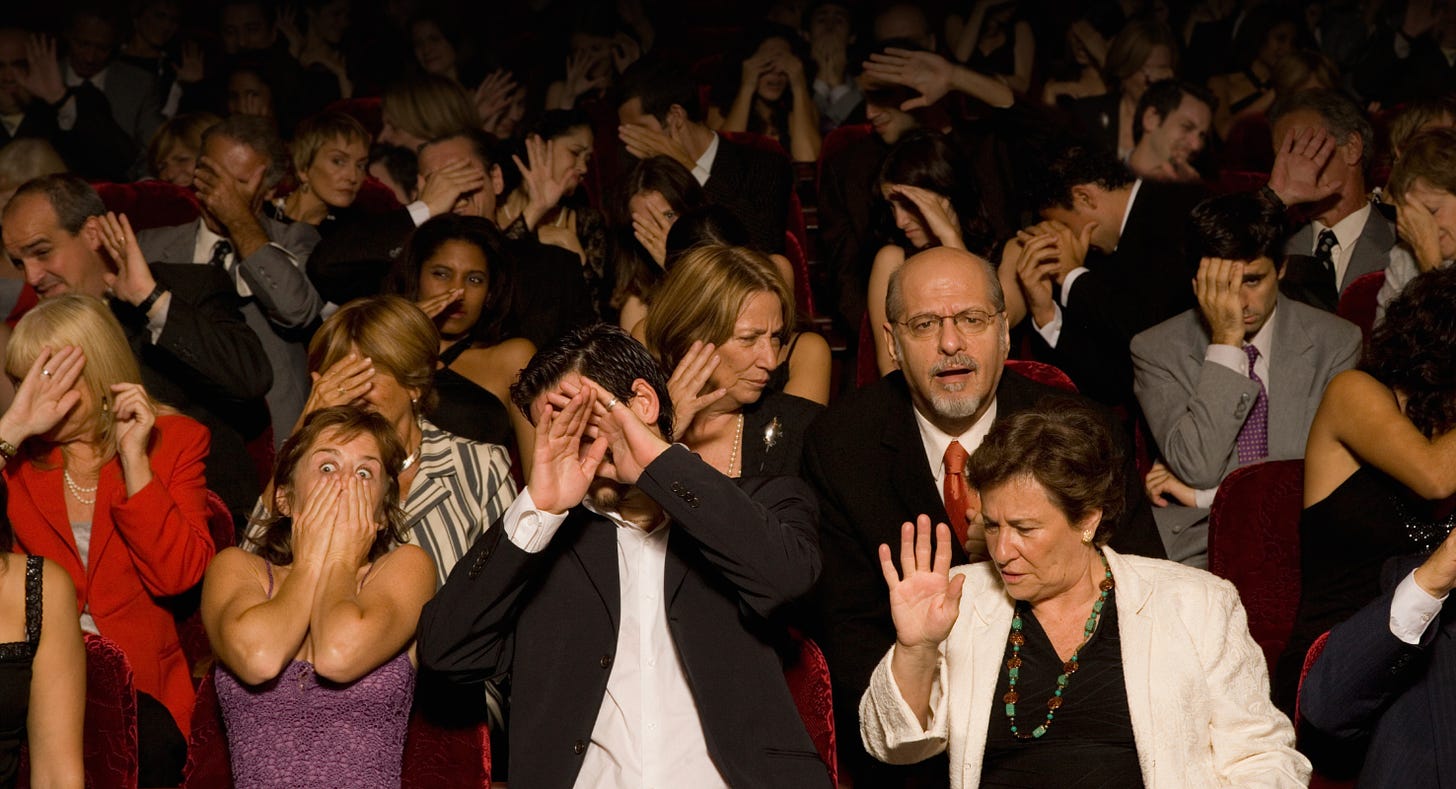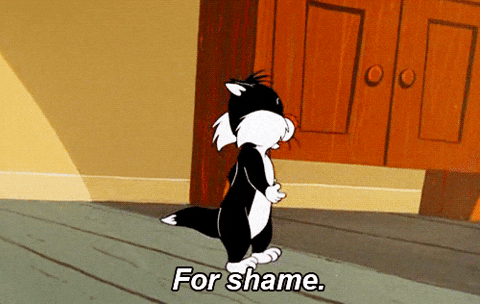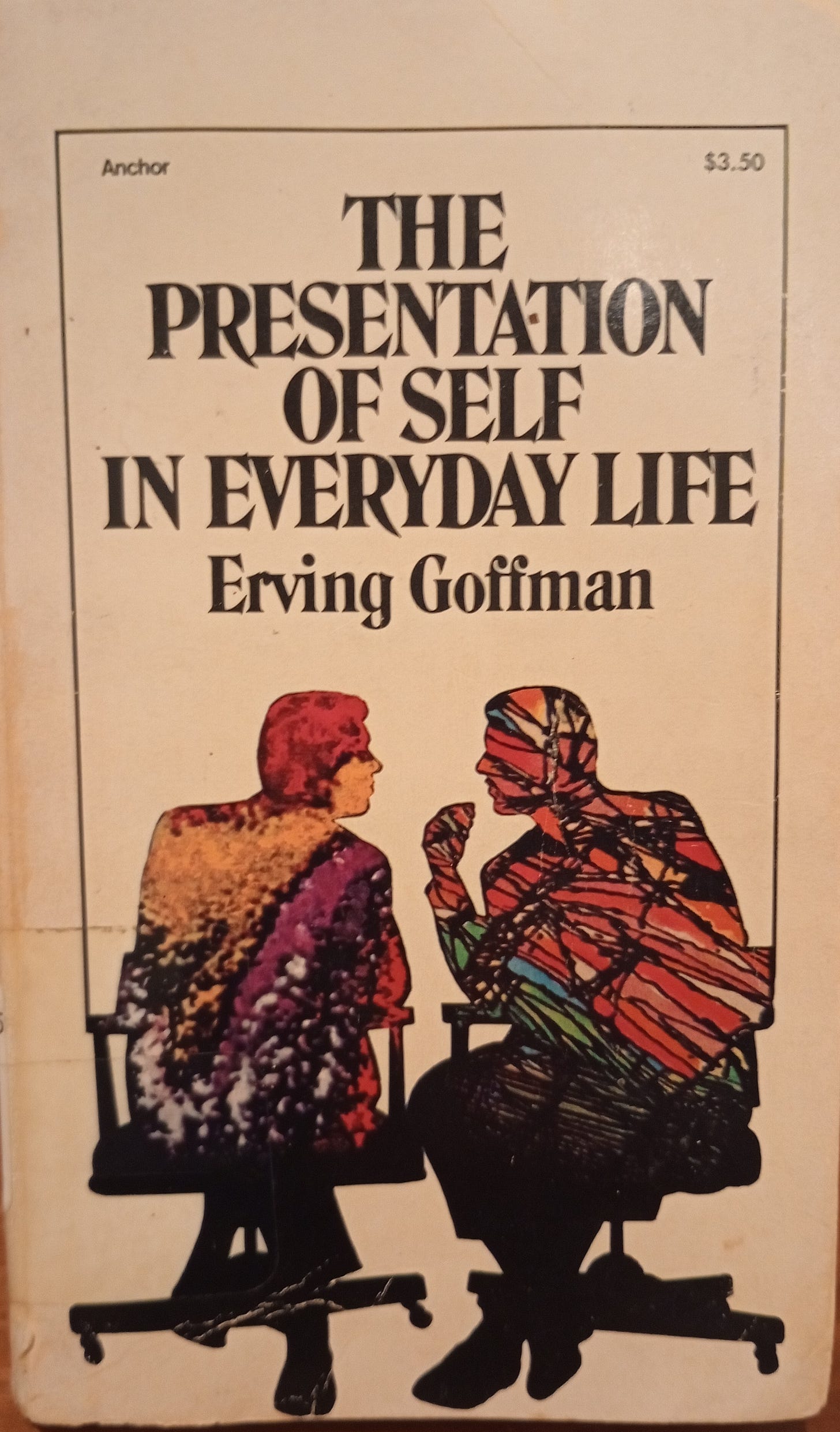Before we begin…
We have among us nearly one hundred subscribers who live in North Carolina, Florida and surrounding areas who have been affected by the recent hurricanes and disasters. If you are one of them or have people in those states, please let us know how best to help. Send links in the comments and please, when you can, let us know how you are.
Welcome! You’ve reached Spark. Learn more here or just read on. If you received this from a friend, please join us by subscribing. And if this email is truncated in your inbox, just click the headline above to come on through and read everything all at once.
The incident
Last week, my husband and I went to see one of the movies selected by the San Diego Italian Film Festival. It was a big deal – we don’t get out much and it marked only the second time I have been to the venue and the festival in almost a decade, ever since I startled myself and everyone else in the theater by violating social norms in a very public way.

Here’s what happened: we arrived in plenty of time for the movie and settled in our seats in the middle of the theater. We smiled and exchanged small talk with those around us. We leaned forward eagerly when the professor with a gorgeous mane of silver hair and an equally gorgeous baritone appeared in front of the audience to welcome us all and provide an introduction to the film. So far, so good.
The movie - god help me, I cannot find the name anywhere now – was to be a quietly funny one about a little girl born into a southern Italian family who spoke and behaved like a northerner. The professor began to speak. Ten minutes later, he was still speaking, taking us through each frame of the movie that was to be shown to us. A half hour after that, he was still deep in the early scenes of the movie, pointing out to us the symbolism of a scene that took place in a kitchen, across a table that the light, entering through the window, struck in a very particular and intentional way. He took a breath and said.
“And, now, shall I tell you what happens next?”
My arms flew up of their own accord and out of my mouth came a plea, loud enough for each of the two hundred or so in the theater to hear, “NO, please DON’T!”
A hush fell. Necks craned in my direction. A mix of murmurs, both scolding and approving swelled around me. My husband stiffened, ready to defend me to the death if necessary but, also, perhaps, to kill me himself. The professor’s face registered shock, then hurt. He ended his lecture and swept up the aisle past me where I sank into my seat and avoided eye contact with him and everyone around me. As we watched the movie, I was grateful for the darkness which, unfortunately, lasted right up to the scene in the kitchen with the window’s light falling across the table. At that moment, the projector broke and the lights in the theater came on. We would never know what happened next. I think there were people there who blamed me for that. I will go to my grave believing the professor broke the projector there on purpose.
My arms flew up of their own accord and out of my mouth came a plea, loud enough for each of the two hundred or so in the theater to hear, “NO, please DON’T!”
I laugh when I tell the story but I cannot tell it without also feeling a jab of …not conscience exactly, but remembered shame. I feel chastened, a little warning inside that tells me to think before opening my mouth.
I’ve been thinking about this incident again, not just because my husband and I returned to the scene of the crime, so to speak, but because of a brief exchange I had recently in the comments section of
’s recent post in her “Ask a sociologist” series. I asked her what she thought might happen if people behaved, unconstrained by social expectations or if it was even possible to do this and still have a functioning society. She brought up Erving Goffman, a “sort-of famous” sociologist who I’d actually heard of and read thanks to this rare interview with novelist Anne Tyler. Robyn explained:“I think that if people did not modify their behaviors for group expectations, it would be a lot more annoying that you might think. One of Goffman’s points is that in modern society, following what he calls the interaction order—the rules for how to behave in social settings—becomes a way to show respect for each other as individuals. When people violate these tiny rules of interaction, it becomes a moral issue. We are affronted when we greet someone we know and they don’t respond. We are, you know, a little outraged. And when we fail to follow the rules (we trip in public or greet someone we don’t know by accident) we feel embarrassment and shame. Those are feelings about morality. In other words, there’s a lot more at stake in following all the social niceties than we think there is.” -
That “jab” of discomfort I still feel has a lot to do with my sense of morality. I was horrified with myself when I saw the professor’s wounded expression. Then there was shame. The disapproval around me was palpable; I can feel it still. I suspect that this is how it was supposed to work. It was a perfect example of how groups can influence someone who has stepped outside the order and reaffirm its rules.
Still, I can’t say I am completely sorry. I wanted to experience the movie for myself. The professor’s detailed discourse was ruining it for me. In addition, the behavior of the group revealed another aspect of the morality question. Mixed in with those who disapproved were a surprising number of folks who came up to me and whispered that they were glad I’d said something but seemed very happy that I had said it and not them. These were people who were willing to suffer in silence for the good of the interaction order but were also perfectly happy to benefit from my own refusal to do so. Who, then, is behaving with the greatest sense of morality? Or does it matter?
In the end, the most interesting thing about being thrown back in time and being prompted to view the incident in a new light is the re-introduction to Erving Goffman and his book, The Presentation of Self in Everyday Life. I’d bought a used copy years ago, after reading the Anne Tyler interview in the Guardian. In the interview, she said the book was invaluable when it came to understanding how to show rather than tell in her novels, how to reveal a character through their behavior. I can see why, even more now than I did when I first purchased the book.
I’ve just re-read the introduction and will be reading the entire book again slowly and carefully. It’s fascinating because the metaphor Goffman uses for social interaction, theater and performance, is dead on. Whether we are aware of it or not, according to Goffman, we humans are always performing. The performance of each player in a situation is based on the context, who they are trying to influence, their social status relative to the others in the group, the knowledge each group member holds, the expectations that come with all of that, and more.
It’s hard to disagree. My behavior is different when I go to the doctor than it is when I go to a writer’s group. When I was in the pharmaceutical industry, my behavior at the office or in front of customers was markedly different than it was at home or with friends, especially friends who did not work at the same company. Whenever I have spoken publicly to a large group, as the professor was doing on the night of the film screening, I have adopted a persona that helps me overcome my shyness like slipping into a costume or donning a mask.
And when I somehow misread the situation or ignore it with negative results, I try to make my words and actions convey how sincerely sorry I am.
But who is the real me, the one who blurts or the one who any number of times has sat through one boring meeting after another without risking a single word? Goffman would argue that there is no central self - that there are multiple selves that we call on as each situation requires. In other words we are always performing whether we are aware of it or not because we are social animals and keeping together is how we survive. Behaving in ways that are expected can be the glue that binds even people who do not like each other. Think about any community you may be in – work, family, your writing group, your book club – and you will immediately see examples of this. I know I do. At its best, our behavior is the way we can show we care about preserving the larger group more than making sure our immediate needs are met.
Reader, I am not always at my best. Sometimes, even now at the supposedly-mature age of sixty-eight, I resent the pressure to behave appropriately. And you know what? For a few seconds, before the full ramifications of my transgression at the festival sank in, I felt a spurt of pure pleasure.
It’s probably a good thing that we don’t get out as much as we used to.
If you like what you see or it resonates with you, please share Spark with a friend and take a minute to click the heart ❤️ below - it helps more folks to find us!
What about you?
Is there a time when you’ve just wanted to say what you want neatly and directly? Is there a time when you’ve found yourself in knots trying not to offend or connect with people who remain oblivious to your needs? Are there times when you just want to disrupt the order to see what happens - or have acutally done this? If you had been in my shoes at the theater that night, how might you have behaved? If you had been in the audience, how do you think you might have behaved?
And here is something I will be exploring in a future post in more detail: do we behave differently as we age? Can we look forward to letting go of the restraints we and groups put on us?
Let’s talk.
More about Goffman and why we act the way we do
Are We All Actors? - this post in The Collector looks at Goffman’s take on the drama of human interaction.
Stop Searching for Your True Self, It Doesn’t Exist - in her blog on Vox, Jara Majerus does a quick take on all the selves that materialize when she is in social settings
But what about behaving in a correct way while behaving immorally? In this piece, researchers explore “pragmatic hypocrisy.”
This obituary for Goffman provides a nice overview of the man and his work for those of us new to him.
And finally, the George Santayana quote that Goffman uses to open his book reflects the relationship between whoever it is I think I am from how I behave. What thoughts does it strike in you?
“Masks are arrested expressions and admirable echoes of feeling, at once faithful, discrete, and superlative. Living things in contact with the air must acquire a cuticle…Words and images are like shells, no less integral parts of nature than are the substances they cover, but better addressed to the eye and more open to observation. I would not say that substance exists for the sake of appearance, or faces for the sake of masks, or the passions for the sake of poetry and virtue. Nothing arises in nature for the sake of anything else; all these phases and products are involved equally in the round of existence.” ― George Santayana, Soliloquies in England & Later Soliloquies
Thank god for fiction
It’s simplistic but true: in fiction — a film, a story, a novel, a play — humans can experiment with behavior that might seem risky in real life. I wrestle with this as a writer but I love it as a reader. I’ve got thoughts on this and how the writer is also a performer that I want to pursue in a future post. In the meantime, I’m reading a lot of Dickens.
Just Finished
Little Dorrit by Charles Dickens. This is the year I fell in love with Dickens. I’m still at the early stages of the affair, that phase when each book is a discovery, unsullied by any attempt to analyze. Yet it is impossible to read his stories without recognizing the truth of what Goffman suggests or why Anne Tyler found his work useful. Dickens shows, in a single line or bit of action, everything we need to know about a character along with how Dickens himself views that character and the society that governs their behavior. In Little Dorrit, as in Great Expectations and David Copperfield, the entire spectrum of human behavior is on display against the backdrop of Victorian England. When I look up from the pages of the novels, I see a very different backdrop but behavior that remains very much the same.
Next Up
Bleak House and Erving Goffman’s The Presentation of Self in Everyday Life which I will read in small bites. Also: Jami Attenberg’s A Reason to See You Again and Desiree Zamorano’s Dispossessed.
A queen of the art of performance
I wish I could have seen Maggie Smith on stage. I’ve watched clips and made lists of her films so that I can watch how she speaks volumes without saying much at all.
Her obituary in the Washington Post stated that Dame Maggie Smith used her performances on stage to become “someone else through her work.” She was quoted:
“There are times when I’m not even sure I have a real life,” Ms. Smith once told Life magazine. “I know it’s only on the stage that I feel really alive.”
Welcome New Subscribers!
If you’ve just subscribed, thank you so much for being here. If you would like to check out past issues, here’s a quick link to the archives. Be sure to check out our Resources for Readers and Writers too where you will find links for readers, book clubs, writers, and writing groups. And if you’d like to browse for your next read, don’t forget to check out books by authors in our community at the Spark Author Page which will be updated with new names and books for next week’s issue. Another great source: the many wonderful reviews you’ll find among the #Bookstackers.
The more the merrier! Please share with your friends and invite them to join us!
Ways to show you like what’s happening here
We don’t do paywalls here but we do work hard so if you’d like to show your support for Spark, here are some ways to do that:
Consider a paid subscription ($5/month or $35/year) or use this as a link that will allow single contributions of any amount via PayPal.
All subscribers will still have access to every post, archives, comments section, etc. If finances are an issue (and when are they not?), you can still show your support for Spark by participating in our conversations, “liking” a post by hitting that heart, and by sharing Spark among your friends. All of these things help bring new subscribers into the fold and every time we expand our audience, the conversation grows and deepens. Click here for more info or click below to subscribe.
Let me know how you are and what you’re reading. If there’s an idea, book, or question you’d like to see in an upcoming issue of Spark, let us know! Use the comment button below or just hit reply to this email and send your message directly.
And remember, If you like what you see or it resonates with you, please take a minute to click the heart ❤️ below - it helps more folks to find us!
Ciao for now!
Gratefully yours,
Betsy
P.S. And now, your moment of Zen…sun storms
When when the sun throws off particles that slam into the earth’s magnetic field, we get aurora borealis, or the northern lights. Here’s what they looked like off the coast of Massachussets this week. Thank you to subscriber Rae Francoeur.
Calling for Your Contribution to “Moment of Zen”:
What is YOUR moment of Zen? Send me your photos, a video, a drawing, a song, a poem, or anything with a visual that moved you, thrilled you, calmed you. Or just cracked you up. This feature is wide open for your own personal interpretation.
Come on, go through your photos, your memories or just keep your eyes and ears to the ground and then share. Send your photos/links, etc. to me by replying to this email or simply by sending to: elizabethmarro@substack.com. The main guidelines are probably already obvious: don’t hurt anyone -- don’t send anything that violates the privacy of someone you love or even someone you hate, don’t send anything divisive, or aimed at disparaging others. Our Zen moments are to help us connect, to bond, to learn, to wonder, to share -- to escape the world for a little bit and return refreshed.
I can’t wait to see what you send!
And remember, if you like what you see or it resonates with you, please share Spark with a friend and take a minute to click the heart ❤️ below - it helps more folks to find us!







Alas, I am often the person who blurts out! Whether asking overly intellectual questions at the parents classroom session at my kids' universities, to answering rhetorical questions at large performances. The trouble for me, is I don't feel shame about it, or rarely! Such outbursts always come from joy, for me. Enthusiasm, a spark of curiosity. I don't dwell or make a fuss if I am not answered, or anything too disruptive. But they are definitely "outbursts". The absence of shame makes me wonder what that means about my personality or wiring. 😁
Wonderful post that came at just the right time. I'll be linking to thos in my own Substack very soon.
As to blurring out my feelings I would have definitely said something had I been in your shoes in that theater. I think Russel might have too, even though he prides himself on being "the perfect guest."
I'm pretty proud of my example. One night long ago, sitting in a fabulous jazz club listening to a talented and popular friend play, I was so irritated by a woman in front of me who wouldn't stop commenting on every song, during each song. Finally, between songs, as she chattered on, I leaned forward and said in a loud whisper, "Nobody else is talking,"
It worked beautifully.